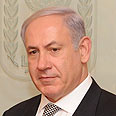
US editorial says Israel similar to North Korea
Op-ed published by POLITICO claims Washington 'too paralyzed to control Israel’s political leadership. Mitchell meets Netanyahu, says will strive to achieve 'real progress' in coming months toward framework peace deal
WASHINGTON - "Israel is a democracy, and Prime Minister Benjamin Netanyahu is in no way similar to (North Korean) dictator Kim Jong Il, but there is a similarity in the confidence both these leaders have that their chief international patrons will support them almost unconditionally," according to an editorial published by the POLITICO website this week.
"One looking at the situation from outer space would presume that Washington had the power and Israel was followed along. But, in fact, Israel seems to be calling its own shots and Washington is too paralyzed to use the power levers to control Israel’s political leadership," columnist Steve Clemons writes.
Robert Danin, who served in the US consulate in Jerusalem, told Ynet the article does not reflect the position of most Americans.
According to him, recent polls show a very high support level for Israel among the American public. However, he added, more and more officials within the US' foreign policy establishment claim Israel receives preferential treatment from Washington.
Meanwhile, US envoy to the Mideast George Mitchell returned to the region on Monday, seeking to revive troubled peace efforts after a major setback in which Washington abandoned efforts to coax Israel to freeze Jewish settlement in areas Palestinians want for a future state.
At the onset of his meeting with Netanyahu, Mitchell said he would strive to achieve "real progress" in the coming months toward a Middle East framework peace deal, despite the collapse of direct Israeli-Palestinian talks.
Launching the first round of shuttle diplomacy since negotiations hit an impasse over Jewish settlement building, the American envoy met Netanyahu at his office in Jerusalem.
"In the days ahead our discussion with both sides will be substantive two-way conversations, with an eye toward making real progress in the next few months on the key questions of an eventual framework agreement," Mitchell said as talks began.
Mitchell shuttled between Israeli and Palestinian leaders for months before direct talks began in September. They broke down weeks later when Netanyahu refused to extend a 10-month freeze on housing starts in settlements in the occupied West Bank.

'Good for Israel.' Netanyahu (L) and Mitchell (Photo: Moshe Milner, GPO)
Earlier this month Washington formally abandoned efforts to persuade Israel to agree to a partial renewal of the settlement moratorium in exchange for security guarantees.
Netanyahu praised Washington's move, telling a business forum in Tel Aviv on Monday: "I welcome this American decision. It is good for Israel. It is good for peace."
Standing beside Mitchell later in Jerusalem, Netanyahu said the goal was now "a new path, to achieve a common goal which is to get a framework agreement for peace that will ensure both peace and security."
Mitchell will hold separate talks with Palestinian President Mahmoud Abbas on Tuesday in the occupied West Bank.
Secretary of State Hillary Clinton announced on Friday the US would refocus efforts on a return to indirect talks and would push to resolve core issues in the six-decade conflict.
These include borders, security, the future of Jerusalem and settlements in territory Israel occupied in the 1967 Middle East War, and the fate of Palestinian refugees.
Palestinian officials, who have been highly critical of the US policy shift, said the seriousness of any diplomacy would depend on a halt to settlement building and setting out clear terms of reference.
Palestinian officials fear settlement expansion on land where they aim to found their state will make statehood impossible, and have voiced concern Israel may try to avoid discussion of their future state borders.
The Palestine Liberation Organization's executive committee met on Monday and said Israel's policy "threatened the stability of the region" and showed its priorities were "settlement, expansion and perpetuating the occupation".
In a statement from Brussels, the European Union also pressed Israel on the settlements issue.
"Our views on settlements, including in East Jerusalem, are clear: they are illegal under international law and an obstacle to peace," said the statement issued by EU foreign ministers.
Also Monday, Defense Minister Ehud Barak met his American counterpart Robert Gates in Washington. During the meeting Barak said he hopes the peace process will continue while preserving Israel's security interests.
Reuters, Attila Somfalvi contributed to the report
- Follow Ynetnews on Facebook










